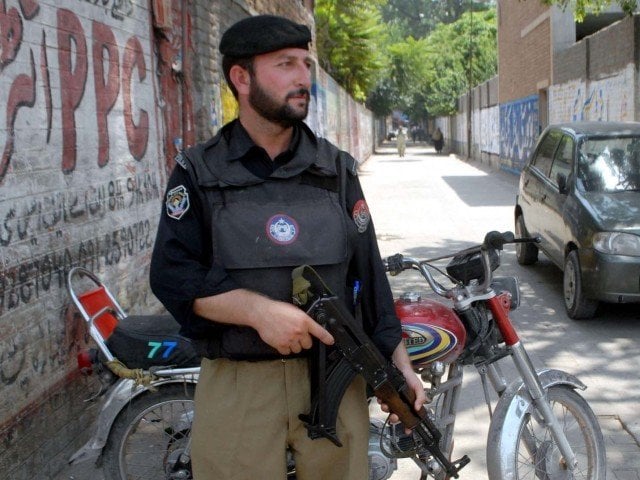
One suicide attack targeted a judge’s vehicle in Hayatabad, another Additional IGP Ashraf Noor’s vehicle, and yet another targeted a Frontier Corps convoy in the same Hayatabad area. The Agriculture Training Institute (ATI) was also attacked by suicide bombers in Peshawar – the fourth suicide attack in Peshawar this year – while the fifth was at a police station in Bannu.
Terrorist attacks across the province claimed a total of 65 lives, 36 of which were civilian and 149 individuals were injured, of which 44 were police officers.
China acknowledges Pakistan's efforts towards peace and stability: ISPR
There was a decline in target killings in Peshawar and other districts with 22 cases being reported this year in comparison to the 68 reported in 2016. This is a decrease of over 60 per cent. In previous years, target killing and firing had emerged as the most effective weapon on the part of terrorists, as improvised explosive device (IED) attacks declined. Target killing was almost completely erased with the elimination of two terrorists, Arif and Mustafa in Peshawar.
The terrorists were able to target additional inspector general (AIG) Ashraf Noor, in Hayatabad, in a suicide attack claimed by ISIS-Khorasan. The police have been left clueless as the high amount of explosives used in the motorcycle, as well as the suicide vest of the rider, left very little evidence to follow.
The attack on the Agriculture Training Institute (ATI) by three suicide bombers was a demonstration by the militants to prove to the police and armed forces that even though their bases in the Federally Administered Tribal Areas (FATA) had been eliminated, they could still strike at will.
K-P offers up plan to absorb FATA departments
The deputy director of the intelligence bureau (IB) was also shot and injured in the Hayatabad area.
Compared to 97 last year, 2017 saw 71 cases of extortion in the province, exhibiting a reduction of 21 per cent, but remaining a big problem for the business community.
The most unfortunate law and order situation in 2017 was the cruel murder of Mashal Khan in April in Abdul Wali Khan University, Mardan. This was carried out in a planned manner and it, without any doubt, shocked the country.
Army throws weight behind FATA reforms
In 2017, police and security forces were finally able to eliminate Arif, a notorious target killer and provincial chief of the ISIS-Khorasan, inside an abandoned flour mill in the jurisdiction of Chamkani police station in June. Earlier, his deputy Mustafa, who was the head of ISIS for Peshawar, had been killed when he tried to attack a police patrol. Arif’s life in militancy began in 2008 and he killed dozens of police officers and government officials in these past 10 years.
Both 2017 and 2016 were indeed the years in which ISIS finally got a stronghold in FATA and KP despite the assurances of security forces claiming that the militant group would not be allowed to infiltrate Pakistan through Afghanistan.
This year Jamaat-ul-Ahrar, the most organised and well-established of all the surviving militant groups in Pakistan, experienced a split as most of the deputies of Abdul Wali Mohmand parted their ways and formed their own faction Hizbul Ahrar led by Mukaram Khan Mohmand.
COAS acknowledges clerics’ ‘contributions for peace and harmony’
It was worrisome for the security forces to hear news of Maulana Fazalullah being successful in making a grand alliance of all Tehrik-i-Taliban TTP factions. The only exception was the exclusion of Jamaat-ul-Ahrar, whose leader Abdul Wali, was not on good terms with Fazalullah.
Speaking to The Express Tribune, a police official said that militancy was still posing a big challenge, thus terrorists were able to strike their isolated attacks.
“We have received threat alerts every single day in this past month. There were reports that the militants could attack the central prison in Peshawar and aim for other important targets, so we are on high alert. This game is far from over,” he said.
“We have arrested 358 militants while 70 have been killed in operations this year. But there is a long way to go as far as militancy is concerned,” he added.
Talking to The Express Tribune, police spokesperson DIG Dr Zahid said that the main challenges faced by the police force were to consolidate gains against terrorism and crime in coordination with other law enforcement agencies and continue with the police reforms agenda for better service delivery.
“There has been a decline in militancy for several reasons; due to a combination of offensive and defensive strategies, an investment in intelligence and the investigation wings have paid off. And of course non-interference in police work and the effective military operations in FATA by the security forces,” he said.





1732012115-0/Untitled-design-(14)1732012115-0-270x192.webp)











COMMENTS
Comments are moderated and generally will be posted if they are on-topic and not abusive.
For more information, please see our Comments FAQ